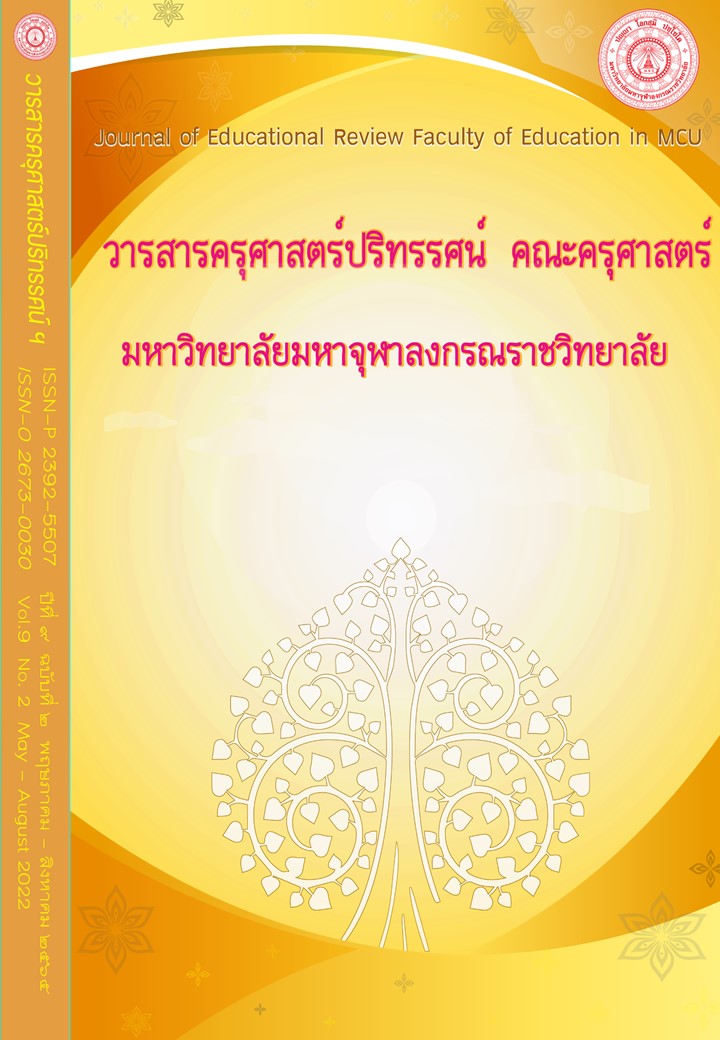GUIDELINES FOR PROMOTING THE AUTONOMOUS SCHOOL
Main Article Content
Abstract
Autonomous school is part of the decentralization of administration and education management comes from the concept of school-based administration that emphasizes on direct to educational institutions in order to make educational institutions responsible and make decisions independently and proficiently. Responsible for results arising from management under the principle of decentralization, principle of participation, self-management principles, and the principle of checks and balances were set. It aims for collective decision-making at the school level between education providers and education service recipients by giving freedom to make decisions both academically personnel management finance and supplies and general administration. Principles of autonomous school must be flexible according to the readiness and context of each educational institution which is different and must have a support mechanism that meets the needs of educational institutions. Factors contributing to success is to be managed by personnel committee to develop and create an understanding of the roles, duties and responsibilities of those involved participation in management and aiming to create a shared vision and values.
Operational guidelines and practices policy Level, the Ministry of Education must announce a policy to develop the efficiency of education administration and management by promoting and supporting educational institutions to be independent and flexible. Decentralization of administration and educational management was used the province as a base at the area level emphasizing the provincial level according to the concept of spatial administration to strengthen and unity in administration and education at the provincial level. It is consistent with the administration of the state affairs which emphasizes on management at the level of management, defining guidelines for joint operations of provincial departments to develop, promote and support educational institutions to be independent according to school level. Educational institution administrators was developed to have knowledge and understanding of autonomous school administration, participate in the operation of educational institutions by participating in the preparation of action plans and organizing training or development of teachers to have the competencies and skills that necessary to organize the learning process.
Article Details

This work is licensed under a Creative Commons Attribution-NonCommercial-NoDerivatives 4.0 International License.
ทัศนะและความคิดเห็นที่ปรากฏในบทความในวารสารฉบับนี้ถือเป็นความรับผิดชอบของผู้เขียนบทความนั้นเพียงผู้เดียว และไม่ถือเป็นทัศนะและความรับผิดชอบของกองบรรณาธิการ
กองบรรณาธิการขอสงวนสิทธิ์ในการคัดเลือกบทความลงตีพิมพ์และจะแจ้งให้เจ้าของบทความทราบหลังจากผู้ประเมินบทความตรวจอ่านบทความแล้ว
ต้นฉบับที่ได้รับการตีพิมพ์ในวารสารครุศาสตร์ปริทรรศน์ คณะครุศาสตร์ มหาวิทยาลัยมหาจุฬาลงกรณราชวิทยาลัย ถือเป็นกรรมสิทธิ์ของคณะครุศาสตร์ มหาวิทยาลัยมหาจุฬาลงกรณราชวิทยาลัย ห้ามนำข้อความทั้งหมดหรือบางส่วนไปพิมพ์ซ้ำ เว้นเสียแต่ว่าจะได้รับอนุญาตจากมหาวิทยาลัยฯ เป็นลายลักษณ์อักษร
References
คณะกรรมการอิสระเพื่อการปฏิรูปการศึกษา. (2562). แผนการปฏิรูปประเทศด้านการศึกษา. กรุงเทพมหานคร: สำนักงานเลขาธิการสภาการศึกษา.
คณะกรรมการอิสระเพื่อการปฏิรูปการศึกษา. (2562). รายงานเฉพาะเรื่องที่ 10 การปรับโครงสร้างในระบบการศึกษา. กรุงเทพมหานคร: สำนักงานเลขาธิการสภาการศึกษา.
คณะกรรมการอิสระเพื่อการปฏิรูปการศึกษา. (2562). รายงานพันธกิจปฏิรูปการศึกษาไทย. กรุงเทพมหานคร: สำนักงานเลขาธิการสภาการศึกษา.
คณะกรรมการอิสระเพื่อการปฏิรูปการศึกษา. (2562). รายงานพันธกิจปฏิรูปการศึกษาไทย สรุปรายงานสำหรับผู้บริหาร. กรุงเทพมหานคร: สำนักงานเลขาธิการสภาการศึกษา.
ดิเรก พรสีมา และคณะ. (2553). รายงานการวิจัยการกระจายอำนาจการบริหารและการจัดการศึกษาสู่เขตพื้นที่การศึกษาและสถานศึกษา. กรุงเทพมหานคร: สำนักงานเลขาธิการสภาการศึกษา กระทรวงศึกษาธิการ.
ประกาศสำนักนายกรัฐมนตรี เรื่อง การประกาศแผนการปฏิรูปประเทศ. ราชกิจจานุเบกษา. เล่มที่ 135 ตอนที่ 24 ก. วันที่ 6 เม.ย. 2561.
ประกาศสำนักนายกรัฐมนตรี เรื่อง การประกาศแผนแม่บทภายใต้ยุทธศาสตร์ชาติ (พ.ศ. 2561 – 2580). ราชกิจจานุเบกษา. เล่มที่ 136 ตอนที่ 51 ก. วันที่ 18 เม.ย. 2562.
พิณสุดา สิริธรังศรี และคณะ. (2549). รายงานการวิจัยการกระจายอำนาจการจัดการศึกษาของประเทศนิวซีแลนด์. กรุงเทพมหานคร: สำนักงานเลขาธิการสภาการศึกษา กระทรวงศึกษาธิการ.
ราชกิจจานุเบกษา.เล่ม 135 ตอนที่ 82ก 13 ต.ค. 2561. ยุทธศาสตร์ชาติ พ.ศ. 2561-2580.
สมศักดิ์ ดลประสิทธิ์. (2557). ข้อเสนอการปฏิรูปการศึกษา (Thailand Education Reform Model :TERM). สำนักงานเลขาธิการสภาการศึกษา. (เอกสารอัดสำเนา).
สมศักดิ์ ดลประสิทธิ์. (2564). แนวทางการจัดการศึกษาเพื่อพัฒนากำลังคนในศตวรรษที่ 21. (เอกสารอัดสำเนา)
สมหวัง พิธิยานุวัฒน์ และคณะ. (2557). รายงานการวิจัยและพัฒนารูปแบบและกลไกการส่งเสริมการกระจายอำนาจการบริหารจัดการศึกษา. กรุงเทพมหานคร: สำนักงานเลขาธิการสภาการศึกษา กระทรวงศึกษาธิการ.
สำนักงานเลขาธิการวุฒิสภา. (2558). รายงานการพิจารณาการศึกษา เรื่อง แนวทางการปฏิรูปการศึกษา. กรุงเทพมหานคร: สำนักพิมพ์สำนักงานเลขาธิการวุฒิสภา.
สำนักงานเลขาธิการสภาการศึกษา. (2557). กฎหมาว่าด้วยการศึกษาแห่งชาติ กฎหมายว่าด้วยระเบียบบริหารราชการ กระทรวงศึกษาธิการ กฎหมายว่าด้วยระเบียบข้าราชการครูและบุคลากรทางการศึกษา. กรุงเทพมหานคร: วี.ที.ซี. คอมมิวนิเคชั่น.
สำนักงานเลขาธิการสภาการศึกษา. (2558). รายงานการวิจัยแนวทางการพัฒนาการศึกษาไทยกับการเตรียมความพร้อมสู่ศตวรรษ ที่ 21. กรุงเทพมหานคร: พริกหวานกราฟฟิค.
สำนักงานเลขาธิการสภาการศึกษา. (2560). บทบัญญัติการศึกษาตามรัฐธรรมนูญแห่งราชอาณาจักรไทย.เอกสารประกอบการประชุมทางวิชาการ (OEC Forum) ครั้งที่ 15 เรื่องรัฐธรรมนูญกับทิศทางการปฏิรูปการศึกษา วันที่ 30 ม.ค. 2560.
สำนักงานเลขาธิการสภาการศึกษา. (2560). แผนการศึกษาแห่งชาติ พ.ศ. 2560 – 2579. กรุงเทพมหานคร: พริกหวานกราฟฟิค.
สำนักงานเลขาธิการสภาการศึกษา. (2560). สภาวะการศึกษาไทย ปี 2558-2559: ความจำเป็นของการแข็งขันและการกระจายอำนาจในระบบการศึกษาไทย. กรุงเทพมหานคร: เซ็นจุรี่.
สำนักงานเลขาธิการสภาการศึกษา. (2562). การศึกษาแนวโน้มความต้องการกำลังคนโดยยึดพื้นที่เป็นฐาน. กรุงเทพมหานคร: พริกหวานกราฟฟิค.
สำนักงานเลขาธิการสภาการศึกษา. (2562). มาตรฐานการศึกษาของชาติ พ.ศ. 2561. กรุงเทพมหานคร: 21 เซนจูรี่.
สำนักงานเลขาธิการสภาการศึกษาและคณะครุศาสตร์ จุฬาลงกรณ์มหาวิทยาลัย. (2558). ยุทธศาสตร์การกระจายอำนาจการจัดการศึกษา. กรุงเทพมหานคร: จุฬาลงกรณ์มหาวิทยาลัย.
สำนักงานเลขาธิการสภาผู้แทนราษฎร. (2560). รัฐธรรมนูญแห่งราชอาณาจักรไทย พุทธศักราช 2560. กรุงเทพมหานคร: สำนักพิมพ์สำนักงานเลขาธิการสภาผู้แทนราษฎร.
สำนักงานสภาพัฒนาการเศรษฐกิจและสังคมแห่งชาติ. (2559). แผนพัฒนาเศรษฐกิจและสังคมแห่งชาติ ฉบับที่ สิบสอง พ.ศ. 2560 – 2564. กรุงเทพมหานคร: สำนักนายกรัฐมนตรี.


